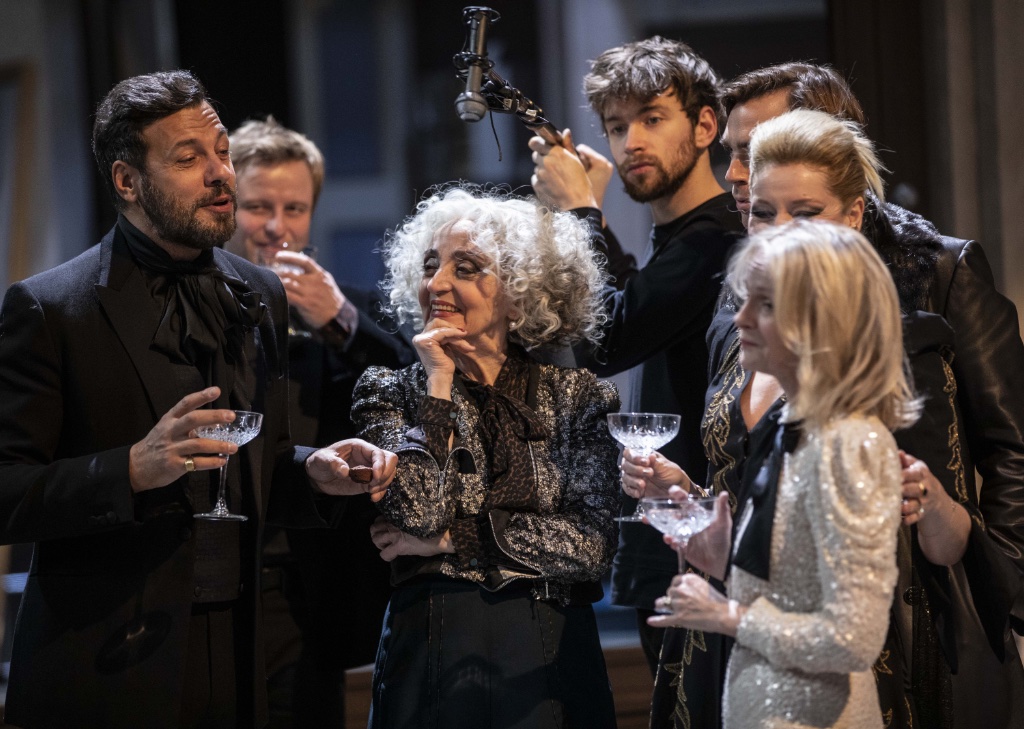
Christophe Honoré, a successful auteur of print, stage and cinema, has now taken on Marcel Proust. Having seen and loved many of Honoré’s films, I was anxious to see his stage “adaptation” of Le Côté de Guermantes at the Comédie Française.
The pairing of Proust and Honoré is not all that unexpected: Honoré’s work is contemporary, sometimes autobiographical, often musical in one way or another and marked by a queer sensibility. The same could be said for Proust, a century before him, and all of these features are on display in the Comédie Française production. Honoré was approached by the director of the national theater troupe in 2018 about producing something for the following season. As he was considering the unexpected proposition, he tells us that he took a long walk in the gardens of the Champs Elysées, a Proustian environment par excellence. It was there that he came upon the idea of presenting onstage the scene of the grandmother’s death, a pivotal moment from the second volume of À la Recherche du Temps Perdu.
Determined from the start not to treat Proust with excessive reverence, he presents the Recherche as an infinitely expanding work of art, capable of addressing the concerns of any era with simple adjustments to costume, music and stagecraft. The result is largely a success and was certainly ecstatically received by the audience on the night I saw it, but it was, for me, something of a mixed bag.
Let’s start with the positive. The play is presented in eight tableaux, ranging from the two aristocratic salons (Villeparisis and Guermantes) that Marcel, the young narrator, is eager to visit, to major episodes involving some of the central characters (Charlus, Rachel, Saint-Loup). It ends with the demise of Charles Swann.
The narrator is largely silent, an observer of the proceedings, but he is also a musician who begins and ends the evening with performances of pop songs on an electric guitar. While incongruous, this works well, as does the brilliant choreography of the large cast as they whirl about the checkerboard-patterned flooring to preen, interact, declare, denounce and generally betray their stupidity.
Key songs include Cat Stevens’ Lady of d’Arbanville, associated here with Marcel’s adoration of Oriane, the Duchess of Guermantes, and the closing number, Nights in White Satin by The Moody Blues, which casts its enigmatic spell over the proceedings. Honoré stays close to the Proustian text, judiciously picking and choosing episodes and witticisms. The writing and direction are elegant, and the acting is without exception superb.
Now to the negative. A play of two hours and 40 minutes with no intermission and little action other than brilliant and tedious conversation, requires some fortitude and, in my case, patience, to follow. From a seat on the upper balcony, it was almost impossible to determine who the characters were, as their faces were largely indistinguishable and their voices sometimes inaudible. Thank god for the women’s colorful clothing and the occasional fright wig.
When a conversation takes place as characters cluster around a painting, with their backs toward at least one portion of the audience, you really must have read the novel in advance and recall the incident in order to make sense of what is going on, even when a microphone is being circulated among them. You can assume that what is being said is pretentious, unintelligent, pompous, and probably self-serving, but still, it would be nice to join the laughter of those in the orchestra section who happen to be seated in the space most amenable to catching the bons mots.
This is Proust, of course, even when adapted, and it is hardly unexpected that it will involve disquisitions on art, military strategy, the Dreyfus affair and genealogy, but, even for those in the know, it still comes off as dense and relentless in its portrayal of upper-crust banality, much in need of comic relief.
When the laughs finally do come, largely in the second half, they make all the difference. As the Duchess of Guermantes decides to lure the young Marcel to her side, she puts on her victrola a recording of that same Lady d’Arbanville and proceeds to writhe across the stage, hopelessly out of sync with the rhythm and deliriously unaware of her own pitiful powers of seduction. Poor Marcel backs away from her, stiffened with horror, as his love for the lady dies a withering death. And when the Baron de Charlus greets the unwitting Marcel in his chamber, having invited the young man to serve as a protégé, he appears as a grotesque opera queen, gesticulating wildly as he proclaims his sensitivity and spewing random insults at his unappreciative listener, who is again horrified. This scene is a comic masterpiece, with a Charlus whose voice and gesticulations reach the farthest corners of the galleries. He takes even further the demented egomania of aging noblesse that we witnessed with the duchess, both of whose wealth and power have failed to mask their sad loss of sexual magnetism and self-respect.
Ending with the poignant Charles Swann dying on his feet as he leaves one great home to visit another, Proust and Honoré leave us with a beautifully honed tribute to the power of art. Even as these monstrosities and fashion victims parade before us, they are etched on our memories as welcome footnotes to some of the most finely drawn literary characters of any age. In the end, Honoré does Proust proud.
Favorite
Nice review! Thanks